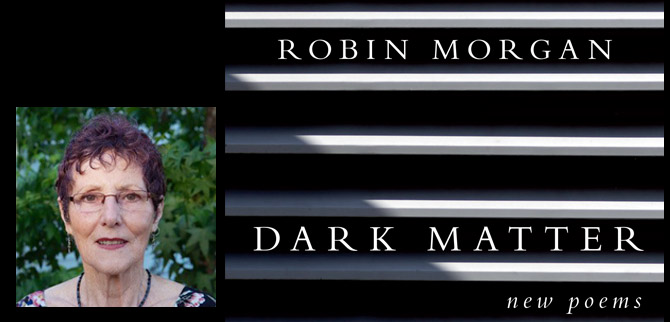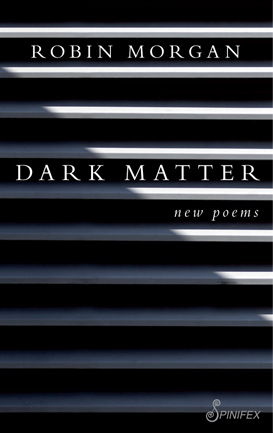Book Review of Robin Morgan’s Dark Matter, Spinifex 2018 by Patricia Sykes
Patricia Sykes is a poet and librettist. Her poems and collections have received various nominations and awards, including the Newcastle Poetry Prize, John Shaw Neilson award and the Tom Howard Poetry Prize Shortlistings include the Anne Elder, Mary Gilmore, and Judith Wright Calanthe awards. She has read her work widely, inlcuding on Australian, Paris and New Zealand radio. It has also been the subject of ABC radio programs, Poetica and The Spirit of Things. Her collaborations with composer Liza Lim have been performed in Brisbane, Melbourne, Sydney, Paris, Germany, Russia, New York and the UK. She was Asialink Writer in Residence, Malaysia, 2006. A selection of her poems were published in an English/Chinese edition by Flying Island Books in 2017. In preparation is the setting of some of her poems from The Abbotsford Mysteries (Spinifex Prezs 2011) for voice (Leanne Keegan) and instruments (Plexus Ensemble) by Melbourne composer, Andrew Aronowicz. http://www.spinifexpress.com.au/Bookstore/
https://rochfordstreetreview.com/category/writers/patricia-sykes/ (review of The Abbotsford Mysteries by Mark Roberts). http://www.millertheatre.com/explore/program-notes/liza-lim
http://rimbundahan.org/patricia-sykes/ https://www.pinterest.com.au/elainedesterre/patricia-sykes-australian-poet-oil-and-gouache/
In Dark Matter, her seventh poetry collection, Morgan cannily exploits poetry’s ability to be both metaphoric and direct. The voice is often conversational and anecdotal, at other times it is layered and allusive. What drives the collection is a deep and passionate intensity, which only a life spent in endless interrogation and interaction with self and world can achieve and sustain. A tension between altered states of being sets the tone, revealing itself in the first poem, The Magician and The Magician’s Assistant. In debating dimensions of self Morgan parallels W. B.Yeats’ perception that “out of the quarrel with ourselves we make poetry”. Dispensing with the roles of both Magician and Magician’s Assistant, the poem concludes:
…nothing is left to perform now.
Sorry to disappoint.
I have my own bare hands full
grasping how
from here on in, all that’s left is the magic.
Throughout the collection the self as touchstone, lynchpin, undergoes shiftings and challenges but the magic remains, is there still in the final poem, Disappear, offering an eloquent bookend to the opening poem:
It will be harder than expected, less severe
than dreamt. Bait your language to snare
particles and constellations. They won’t care.
Plan to close with an epic song, naming the sheer
grace of galaxies, quarks, mitochondria, each atmosphere
you’ve loved, every breath, everyone, everywhere—
This is one of the tighter metrical poems, achieving the charm of surprise through deft imagery, more so than is the case in some of the looser, freer verse poems. The diversity of the collection, however, has an allure of its own: modal variety. Not every poem functions at the same intensity. Morgan demonstrates this again and again, modulating, for example, from the wryness of Barbarina’s Cavatina:
Surely a petty tragedy,
humorous even, hardly
worthy of the minor key.
into the fiercer engagement of Reading the Bones:
Look! Do you see? A rose, a star! The hourglass fills,
drains. Ignore the tourists, look away from the window.
Here, wear the garland; it’s meant for you. So are these
fragments, assembled with passion, indifference, reliable pain.
Look! Do you see? A poem, layer on layer, words puzzled together,
bones from the catacomb of a brain.
Earlier in the same poem Morgan invokes one of the collection’s recurring themes, the interaction between time and self in the progression towards ageing and death:
Decades ago, in Rome’s Capuchin catacombs, I took notes
to play with in my private funeral games, then dared not
use them until now.
Much of the poignancy of the collection arises from Morgan’s argument with decay. There is no surrender — art and life require courage after all, particularly in the face of mortality — instead there is engagement and re-engagement, resistance, defiance:
…Death’s alive
with activity, bright putrefescent bacteria.
Compost squirms hot, carbolic.
Stillness not to be found since the big bang
shuddered awake through each vibrating string.
Who are you, then, to mourn? Whitman dared sing
the body electric. Here’s your chance.
Go him one better, dear. Dance.
(Invitation).
And dance Morgan does, unreservedly, with gusto, though the dance encounters serious risk, as in Grey Matter:
Given decades of picketing, petitions, a jail or two,
and worse —the torture of meetings —I find
the diagnosis name hilarious
…
What’s scientific is a neurological disorder
they call degenerative (sounds like a moral judgement)
which prompts my lovely brain to spit
stutters through nerves and muscles…
Deeper into the same poem, Morgan effectively uses the device of apostrophe as a revelation tool:
…So, Brain,
what do we do now, you and I? You know
damned well you were always my favourite,
you know I never fell for that trash about having guts
or the heart as the seat of emotions. You know I knew
it was always you, neurotransmitters abuzz, electro-chemical
synapses; waves and frequencies jigging: oh splendid powers
of the brain, I always loved you best.
Loquacious, affirmative, emphatic, there is a sense throughout the poems that no significant or relevant concern is left unspoken. If occasionally I wished for fewer words I never wished for less verve. Inevitably perhaps the question of biography arises in a collection such as this where the “I” is foregrounded: whose is the voice speaking the poems, which version of the poet in which poem, and in what autobiographical space-time? Unanswerable, clearly, for poetic as well as philosophical reasons:
The old woman is never wholly who she thinks she is
because she’s also always everyone she ever was —
though never quite the woman others are sure they knew.
(The New Old Woman)
A more salient point is that Morgan establishes connection between the work and the reader through careful crafting and structure, as well as through intimacy and empathy. The topics of family, friends, love, politics, religion, history, myth, activism, art, culture, ageing, death, among others, touch us all. The whole therefore is in the nature of a shared archives between poet and reader, a conversation striving always towards negentropy rather than entropy.
It’s a labyrinthine journey, winding through four sections, four interlinked catacombs if you like: Doing the Blood Work, The New Old Woman, Grey matter and finally Dark matter. The accumulative effect of this poetic expedition is one of resonances. Major, minor, augmented, diminished, no key is excluded. Each pays its dues to the dark — ultimately unknown — yet vibrant universe which gives the collection its title.
Dark matter then may operate as a symbolic nemesis but it is not a death sentence, rather it is a stimulus, an opportunity to celebrate beingness above all else. It is no small achievement to end a collection on an unresolved cadence. In so doing Morgan asserts not only the creative privilege of open endedness but of vitality and endurance:
…Opt for a quiet tone, wry tear;
invoke laughter, step lightly, be of good cheer.
Live at the ready. Sacred each passing year
within grasp beyond reach, unknowably clear,
until all you were, crashing against the shallows of here
as pearls of foam, ebbs, and you just
(Disappear)
No end stop, no rigor mortis: “There can be no such thing as closure./When you prod the beast it springs” (Disclosure). If it is wrenching to have reached this hovering shore it has been, for this reader, worth the voyage.
© Patricia Sykes



